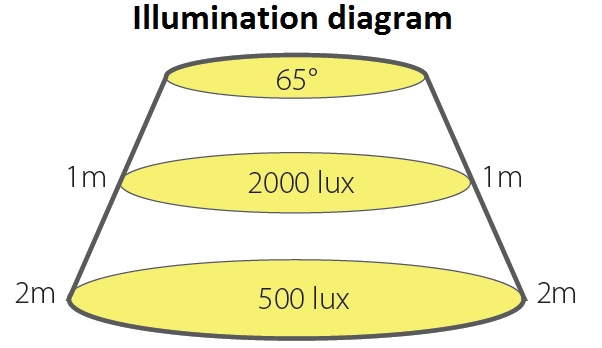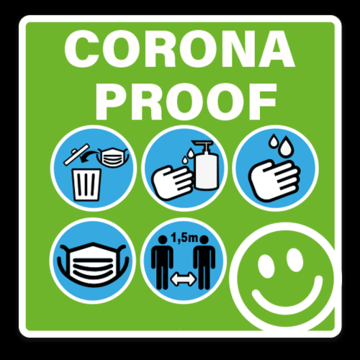
Illuminance is a measure of how much luminous flux is spread over a given area. Illuminance is measured with optical device called lux meter. Luminous flux (measured in lumens) is a measure of the total amount of visible light present. The illuminance is a measure of the intensity of illumination on a surface. A given amount of light will illuminate a surface darker if it is spread over a larger area, so illuminance is inversely proportional to area.
One lux is equal to one lumen per square meter: 1 lx = 1 lm/m2
Because LED lights have much higher luminous flux than other light sources, we can achieve higher illumination with LED lights than other light sources.
A flux of 1,000 lumens, concentrated into an area of one square meter, lights up that square meter with an illuminance of 1,000 lux. However, the same 1,000 lumens, spread out over ten square metres, produce a darker illuminance of only 100 lux. If we put the light higher we can illuminate the wider area, but the level of illumination will be lower. We can show this relationship with illumination diagram.
For better imagining of Illumination in lux we can compare the illumination of natural lights sources measured in lux.
| Surfaces illuminated by: | Illuminance[lx] |
| Full moon on a clear night | 0,27 |
| Twilight under a clear sky | 3,4 |
| Sunrise or sunset on a clear day | 400 |
| Overcast day | 1.000 |
| Full daylight (not direct sun) | 10.000 - 25.0000 |
| Direct sunlight | 32.000 - 130.0000 |
For different task different levels of illumination are prescribed. It is important that we have enough illumination when we are performing different tasks.
| Activity: | Illuminance[lx] |
| Warehouses, homes, theaters, archives | 150 |
| Easy office work, classes | 250 |
| Normal office work, PC work, study library, groceries, show room, laboratories | 500 |
| Supermarkets, mechanical workshop, office landscape | 750 |
| Normal drawing work, detailed mechanical workshop, operation theatres | 1000 |
| Detailed drawing work, very detailed mechanical works | 1500 - 2000 |
- Accessoires
- Ampoule
- Eclairage de hall
- Decoratif
- Downlighter
-
Armatures
- Appareils sur rail avec raccords GU10 AR111 PAR30 E27
- Armature avec panneaux de LED intégré IP65
- Armature plug&play avec panneaux de LED intégré IP66
- Armature IP67 pour l'industrie agricole
- Luminaire led sport IK10 IP65 avec couvercle PCN
- Armature LED-TL
- Bollard IP66
- Bulkhead IP66 IK10
- Douille E27 en béton, cuivre et fonte
- Lumière LED intégrée à induction
- Luminaire extérieur en laiton IP65 RVBB et Bluetooth
- Lampe LED à rebord rotative IP67
- Luminaire suspendu linéaire LED
- Luminaire ECO linéaire a LED LINECO
- Luminaires suspendus
- Projecteurs
-
Led strips
-
IP20 Led Strips
- Low Power, IP20, 2835 60LED/m, 4.8W/m, 8mm PCB
- Low Power, IP20, 2835 120LED/m, 9.6W/m, 8mm PCB
- IP20, 2835 60LED/m, 14.4W/m, 10mm PCB
- IP20, 2835 120LED/m, 19.2W/m, 10mm PCB
- RGB, IP20, 5050 60LED/m, 14.4W/m, 10mm PCB
- IP20, 2110 120LED/m, 7.2W/m, 4mm PCB
- IP20, 2110 180LED/m, 12W/m, 10mm PCB
- IP20, 2110 240LED/m, 15W/m, 10mm PCB
- IP20, 2110 300LED/m, 18W/m, 10mm PCB
- Nature led strip met violet chip, IP20, 2835 70LED/m, 9.6W/m, 8mm PCB
- Nature led strip met violet chip, IP20, 2835 140LED/m, 19.2W/m, 10mm PCB
- Tunable ledstrip 98CRI 2000K~3000K, IP20, 168LEDs/m, 16.8W/m, 10mm PCB
- Bande led ultra longue série 10~100m IP65
- IP67 Neon Led Strips
-
IP20 Led Strips
- Lampe Machine et Bureau
- Dalle
-
Spot
- MR16 RVB
- AR111 RVBB
- Lampes Dimmable avec température de couleur variables 2-3k AR111
- AR111 Dimmable avec température de couleur variables 2-3k
- AR111 économique
- GU10 économique
- MR11 Dimmable avec température de couleur variables 2-3k
- MR16 économique
- MR16/GU10 Module Dimmable avec température de couleur variables 2-3k
- Spot induction extérieur 3W-9W-18W
- Spot induction sur pied 3W~18W
- TL
- Tracklight

